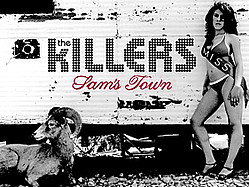Six years ago today, the Killers came charging into town aboard Sam's Town, a thundering bison of an album that aimed to kick up some dust clouds and rattle a few windows. Indeed, this was a record that sought not only to proselytize, but to galvanize, one of "the best in the past 20 years," a proudly Pro-Patria effort that would transform a group of sparkly, slightly-effete synth poppers into the next great American band, like Bruce and the E. Streeters, only with better fashion sense. It was, in a lot of ways, meant to change the world as we know it.
Of course, you are probably aware things didn't quite turn out that way. Sam's Town opened big (selling more than 315,000 copies to debut at #2 ... behind Evanescence's The Open Door), but quickly dipped down the charts. It would eventually be certified platinum, though that number was more than three times less than the Killers' Hot Fuss breakout. But even worse, most critics mauled it, dismissing it as one of the most overwrought, self-important efforts in recent memory, the sophomore album to end all sophomore albums.
It also seemed to really rattle the Killers, to the point where their follow-up — 2008's Day & Age — seemed to be their attempt at making the most un-Sam's Town album imaginable (which is to say, a Duran Duran album) much to their detriment. In fact, one could argue that the Killers have never been the same band since they released Sam's, that somehow their bravado had been broken and that, rather than trying to conquer the world, they were content to simply enjoy their little corner of it.
And really, all of that is sort of a shame. Because, 2,191 days after its release, I'm finally ready to admit that we were probably wrong about Sam's Town, and that we all did our own little part in helping bury it (in my review, I called the record "pompadocious," which isn't even a real word.) In six years, after more listens that I can possibly count, I've come to view it less as a misguided passion project, and more for what it really is: one of the most unappreciated — and misunderstood — albums of the past decade (and it looks like I'm not the only one who thinks that).
And I say "misunderstood" not from a musical standpoint (because with its myriad of strings, horns and choirs, Edge-indebted riffs and, uh, instrumental "Enterludes," it's pretty clear what the Killers were going for here), but in terms of sentiment, the guiding principles behind its sonic heft. At the time — due in no small part to Brandon Flowers' willingness to drop bon mots like "best in the past 20 years" and openly worship at the altar of the Boss — the line of thought seemed to be that Sam's Town was the end-product of supreme ego gone awry, of a band clearly too big for their britches. Though in hindsight, I think that assessment was wrong.
Because for all the confidence Flowers displayed during its making, Sam's Town is an oddly uncertain album. He spends no small part of it meekly asking questions — "Why do you waste my time?" "Can you read my mind?" "Do you ever think of me?" "Can we climb this mountain?" — and, apparently unsatisfied with the responses he's getting, ultimately decides "It doesn't really matter." He yelps and shakes and admits "Sometimes I'm nervous when I talk." None of it gibes with the image of the cocksure frontman Flowers worked so hard to cultivate, until you look beyond that and see him for what he really was: a (then) 25-year-old who had the world thrown at his feet, a kid who clearly wasn't ready for the weight of expectation. His confidence, it would seem, was little more than an act, a carefully constructed role. In a way, you can't help but feel sorry for him, especially the way things ended up playing out.
Which is why, despite its general largesse, Sam's Town remains a really intimate record. Sure, there doesn't seem to be a studio trick the band couldn't be talked into trying (just listen to the title track), but no matter how much bombast they're wrapped in, songs like "For Reasons Unknown," "Ready My Mind" and "My List" still manage to be, well, strangely sweet ruminations on life and love. Even at its most red-blooded (and this is definitely a red-blooded album, full of patriotic paeans to the America Dream and an active dislike for residents of "the land of the free ride" ... no wonder Mitt loves them so much), Sam's Town comes off, at worst, just a bit misguided. Overall, Flowers seems largely adrift, a man trying very hard to figure out just what in his life was real. Did he ever find the answers he was looking for, or did he merely stop asking the questions?
And perhaps that will end up being Sam's Town's legacy. It marked, in many ways, the end of ambition, both from the Killers themselves and their major-label brethren. In the six years since its release, Flowers and Co. have clearly tempered their expectations and bitten their tongues, and I can think of only two big-name acts who have even attempted to replicate Sam's size and scope (My Chemical Romance and, uh, Linkin Park ... both of whom suffered similar fates). In every way, this was an anachronistic, unapologetically huge album, and it was an equally massive disappointment, at least to the folks at Island Records. There's a reason bands don't make records like this anymore: they learned from the Killers' mistakes.
And that's probably the biggest shame of all. Without risk-takers, rock has become a sad, staid affair. Sure, Sam's Town is probably to blame for this, but so are we, the folks who actively derided the Killers for not only having ambition, but proudly admitting to possessing it. Is Sam's Town a failure? By commercial standards, sure, but looking at its sales alone is selling it short. Creatively, it marks the Killers' high-water mark, a place they'll probably never get to again (for better or worse). It is unapologetic in both scope and intent, the kind of record bands used to make, until they wised up ... or chickened out. It is a cautionary tale and a touchstone album, a fascinating, flawed look at a man trying to figure out his life with the whole world watching. And shoot, songs like "When You Were Young" and "Read My Mind" still sound great after all these years.
Of course, I'm just realizing all of this now. Maybe someday more folks will come around to Sam's Town too, or at least come to view it in a different light. One thing's for certain, in the time since it was released, everything has changed, both for the band and the industry at large ... which, come to think of it, was precisely what the Killers set out to do when they made it. They probably just didn't think it take so long for that change to happen. Like they sang at the album's end, "Seems like heaven ain't far away." Six years later, they're still trying to get there.





